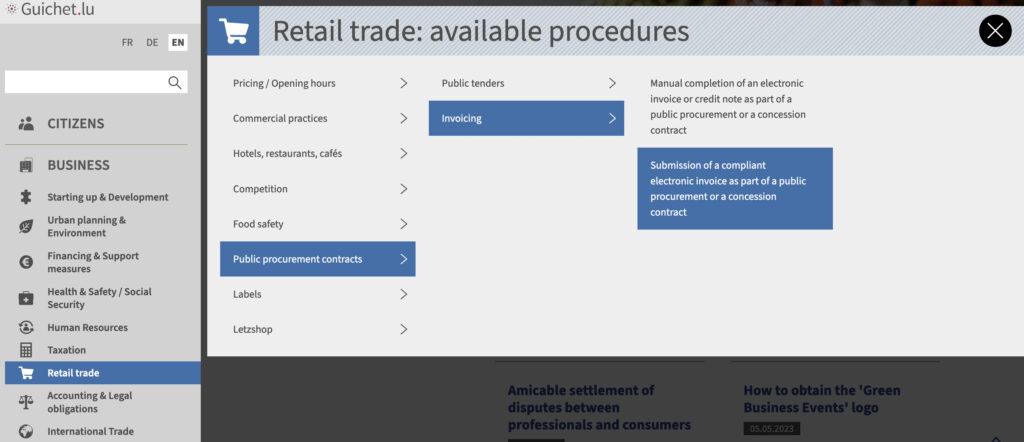From 18 March 2023, all economic operators will have to comply with the obligation to issue electronic invoices in the context of public contracts, in accordance with the law of 16 May 2019 on electronic invoicing, as amended by the law of 13 December 2021.
While this obligation has already existed for large companies since 18 May 2022 and for medium-sized companies since 18 October 2022, it is now all the other players in the market (small companies, the self-employed, craftsmen, ASBLs, etc.) who will have to comply with these new formalities.
First of all, it is important to note that, by definition, public contracts are “contracts for pecuniary interest concluded in writing between one or more economic operators and one or more contracting authorities“, so this e-invoicing obligation is not linked to prior participation in a public contract procedure.
A craftsman contacted directly by a local authority to carry out repair work, in return for a modest fee (in any case below the thresholds for public contracts that would require a formal procedure), will therefore be a party to a public contract, in the legal sense of the term, and will therefore have to comply with the new obligations in terms of invoicing.
Secondly, “electronic invoicing” should not be reduced to the mere electronic transmission of an invoice.
According to the amended law of 16 May 2019, an electronic invoice is one “that has been issued, transmitted and received in a structured electronic form that enables it to be processed automatically and electronically (…)“.
So, while sending an email with an attached invoice in PDF format would certainly comply with the obligation to transmit electronically, its structure would not correspond to the standards required by the most recent European standard (EN 16931-1:2017), which sets out the semantic model for the data that must be present – and identifiable – within the electronic invoice.
In practical terms, the electronic invoice will therefore be an XML file (for Extensible Markup Language), i.e. a text file containing tags enabling a number of mandatory values to be defined: the amount, the VAT rate, the recipient, the issuer, and so on.
As well as being structured and transmitted electronically, this electronic invoice must also be received automatically by the public entity to which it is addressed.
This last formality is accomplished by using a common delivery network: the PEPPOL network (for Pan European Public Procurement OnLine).
To this end, it is not necessary for an operator wishing to issue an invoice to a public entity to be registered directly with the PEPPOL network, as the system operates in practice via access points.
These access points, for example companies developing billing software solutions, are like mobile phone operators who will provide access to the network.
For those who do not have such a software solution, or who sporadically issue invoices to public entities, an “online form” has been provided for via the Grand-Ducal regulation of 13 December 2021 determining the common delivery network and alternative technical solutions.
This form has taken the form of the addition of a new tool within the “MyGuichet.lu” professional area enabling an electronic invoice that complies with the required standards to be generated and sent directly:

For the sake of legibility, a scanned invoice can – and often will be required by the public purchaser – be sent at the same time, with the MyGuichet platform providing for the possibility of attaching a “supporting document“.
For the sake of completeness, it should be noted that if this obligation is not met, the public purchaser will have no choice but to reject the invoice received via another channel (by post, by email), which could result in payment delays for the issuer.
Finally, from the point of view of the contracting authorities, it will be important to specify in the tender documents the way in which those who have won a public contract will have to comply with this obligation, particularly if an invoice validation process (for example via an architects’ office) has been put in place.
For more information on invoicing issues in public contracts, please contact our law firm.

